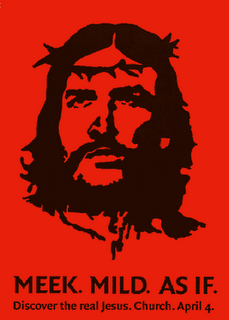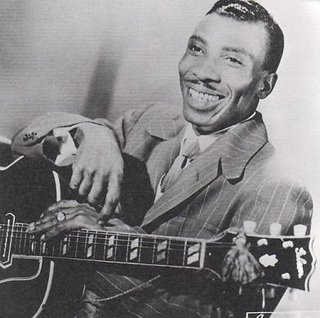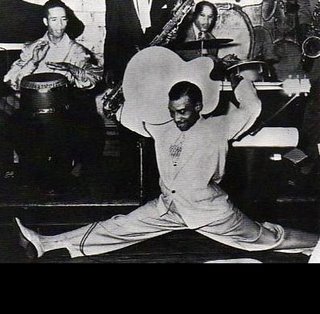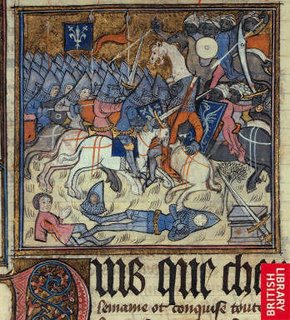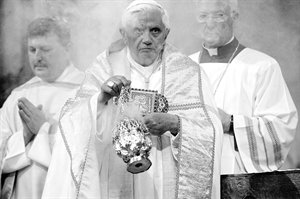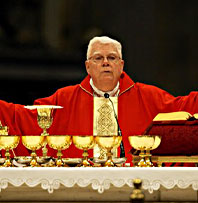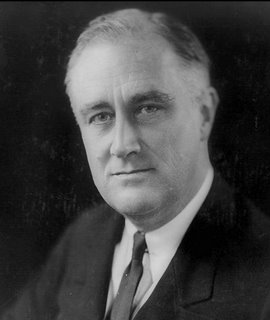
I have some friends who’ve visited my blog and read my posts, but have not commented. I think that some of them feel somewhat confused, disappointed, and maybe even a little bit betrayed by what they perceive as a leftward shift in my thinking in what they’ve seen posted here.
My friends should remember, however, that as much as I detested communism, I never held libertarianism in much higher esteem. They know I’ve never been comfortable with the Republican program based on the Milton Friedman/Frederich Hayek schools of economics. I’m a Keynesian.
I tend towards social conservatism and economic liberalism. I believe that a just society should have a safety net, but should actively pursue policies that discourage behaviors that often cause people to fall into it. Happily, my Church tends to agree with me. In my critiques of communism and consumerism, I believe that my thinking is very much in line with that of Pope John Paul II and the U.S. Conference of Bishops.
In American politics, however, my brand of populism is entirely unrepresented. In fact, both parties are increasingly trending towards the exact opposite – social liberalism and economic conservatism. The country is turning more and more towards libertarianism. The public seems entirely acquiescent in accepting policies that are bound to draw us back to the days of that great libertarian “utopia” that existed in 1930 under the Herbert Hoover administration – The Great Depression.
At one time, my thinking was represented by the Democratic Party. At one time the Democratic Party was first and foremost concerned with the economic prosperity of the common man and woman. Unfortunately, by the beginning of the 1970’s it turned its attention primarily towards the advancement of the particular causes of special interest groups and got lost in a swirl of racial, sexual, and gender politics. When control of the Democratic Convention in 1972 was wrested from the union bosses and the old guard, they lamented that the Democratic Party had become the party of “Acid, Amnesty, and Abortion.” It still hasn’t recovered from this, the Viet Nam War, and the legacy of the party realignment in the South that resulted from the Civil Rights struggle.
I find the 1930’s one of the most fascinating decades in history. In Europe it was the scene of the great struggle between the two wings on the bird of totalitarianism – communism and fascism. In the United States, it was the ordeal of the Great Depression, and the cast of colorful characters who put their mark on that decade, people like Franklin Delano Roosevelt, Walter Lippman, Will Rogers, Henry Ford, Dr. Francis Townsend, Al Smith, John J. Lewis, Walter Reuther, Father Charles Coughlin, Norman Vincent Peale, James Michael Curley, and the “Kingfisher”, Huey Long. It was the Golden Age of Hollywood, the radio program, and Big Band Swing. I guess that one of the reasons it resonates so much with me is that it was the era of my parent’s childhood, and my own upbringing was steeped in stories from my grandparents and parents about the hardships of that era. It is hard to appreciate today just how desperate people were during those days. In spite of the poverty, however, the real sense was conveyed that this was an era in which people really pulled together in the face of common adversity.
A small clip of of Bing Crosby’s 1932 hit,
Brother, Can You Spare A Dime?They used to tell me I was building a dream
And so I followed the mob
When their was earth to plow or guns to bear
I was always there right on the job
They used to tell me I was building a dream
With peace and glory ahead
Why should I be standing in line
Just waiting for bread?
Once I built a railroad, I made it run
Made it race against time
Once I built a railroad, now it's done
Brother, can you spare a dime?
Once I built a tower up to the sun
Brick and rivet and lime
Once I built a tower, now it's done
Brother, can you spare a dime?
Once in khaki suits, gee we looked swell
Full of that Yankee-Doodly-dum
Half a million boots went sloggin' through Hell
And I was the kid with the drum
Say, don't you remember, they called me "Al"
It was "Al" all the time
Why don't you remember, I'm your pal
Say buddy, can you spare a dime?
Once in khaki suits, ah gee we looked swell
Full of that Yankee-Doodly-dum
Half a million boots went sloggin' through Hell
And I was the kid with the drum
Oh, say, don't you remember, they called me "Al"
It was "Al" all the time
Say, don't you remember, I'm your pal
Buddy, can you spare a dime? Back in June, Anthony Brooks held this
On-Point radio interview with Jonathan Alter, Newsweek columnist and author of
"The Defining Moment: FDR's Hundred Days and the Triumph of Hope". It was a fascinating interview about the challenges FDR faced when he took office, and the prevailing mindset that had to be overcome. At that time, the conventional thinking was that the government owed people absolutely nothing. The huge masses of unemployed men, unemployed due to conditions outside of their control, were conditioned to believe that if they were without a job, it was entirely their fault. It represented a moral failing on their part, as titans of industry like Henry Ford constantly reminded them.
In the desperation caused by this unprecedented and intractable depression, many people became frustrated by this “hands-off” approach on the part of the government, and people started to look elsewhere for succor. Many people forget today that the term “Dictator” did not carry the same negative connotation back then that it does today. There were many thoughtful people in the 1930’s who were openly wondering if republics were finished. They wondered if capitalism had run its course, and if liberal democracy was going to be thrown on the trash heap of history, to be nudged aside by upcoming communism and fascism, which seemed to be “working”. The tide of history seemed to be on their side. At that time, the Italian dictator Benito Mussolini had admirers who pointed out how he’d made chronically inefficient Italy efficient, a place where the trains now ran on time. Similarly, throughout the 1930’s Hitler was looked upon with admiration by some as a man who had lifted Germany out of poverty and staggering hyper-inflation, putting his country back to work, and restoring pride in the nation. There were many, including the influential Walter Lippman, who urged FDR to assume dictatorial powers when he became president. He even urged him to raise his own private army if he needed to. FDR resisted those voices and temptations, as much as he may have been tempted.
In his Inaugural Address in 1932, he was is most famously remembered for having said:
Let me assert my firm belief that the only thing we have to fear is fear itselfThis was not the line that drew the most applause in his speech. The line that drew the most applause was;
But in the event that the Congress shall fail to take one of these two courses, and in the event that the national emergency is still critical, I shall not evade the clear course of duty that will then confront me. I shall ask the Congress for the one remaining instrument to meet the crisis--broad Executive power to wage a war against the emergency, as great as the power that would be given to me if we were in fact invaded by a foreign foe. Another interesting aspect of the speech that you don’t hear about much today was the spiritual element in it. He called it a “day of national consecration”, and said the following, which surprised me. I wish some politician would say it today:
The money changers have fled from their high seats in the temple of our civilization. We may now restore that temple to the ancient truths. The measure of the restoration lies in the extent to which we apply social values more noble than mere monetary profit.
Happiness lies not in the mere possession of money; it lies in the joy of achievement, in the thrill of creative effort. The joy and moral stimulation of work no longer must be forgotten in the mad chase of evanescent profits. These dark days will be worth all they cost us if they teach us that our true destiny is not to be ministered unto but to minister to ourselves and to our fellow men.
Recognition of the falsity of material wealth as the standard of success goes hand in hand with the abandonment of the false belief that public office and high political position are to be valued only by the standards of pride of place and personal profit; and there must be an end to a conduct in banking and in business which too often has given to a sacred trust the likeness of callous and selfish wrongdoing. Small wonder that confidence languishes, for it thrives only on honesty, on honor, on the sacredness of obligations, on faithful protection, on unselfish performance; without them it cannot live. FDR did act quickly and decisively in his first 100 days, but he resisted the call to suspend the Constitution. He did get into some hot water in his second term for trying to pack the Supreme Court, but backed off in the face of his opposition. Foremost, as the interview points out, he was not afraid to DO something. He experimented, and wasn’t afraid to try out new ideas. He was a man of great intellectual curiosity who wasn’t afraid to change course or to change his mind when presented with new information. A very stark contrast to the lack of effective leadership we see today.
Through the infusion of government capital, and the introduction of the WPA and massive public works projects, FDR was not only able to save the country from a socialist revolution and restore the pride and confidence of the public in putting people back to work, but the public works projects helped to modernize the infrastructure of the country. Dams, bridges, reforestation, highways, the Tennessee River Valley Authority… the evidence and the benefits of the projects are still with us today.
It is important to remember though, that FDR was not universally liked. There was a lot of grumbling about the “New Deal” being the “Raw Deal” or the “Jew Deal”. The NRA (National Recovery Act) as standing for “No Republicans Allowed”. If you were a businessman in those days, there was a lot not to like about him. My wife’s grandfather had his own successful filling station, and he turned out to be no admirer of FDR. I also once had a girlfriend whose father explained to me over the dinner table that the problem he had with FDR is that he was “a traitor to his class”. He also liked this ditty:
A little more than 5,000 years ago, Moses said, 'Hitch up your camel, lift up your shovel, mount your ass. I will lead you to the promised land.' Five thousand years later, Franklin Roosevelt said, 'Light up a Camel, lay down your shovel, sit on your ass. This is the promised land.'(Actually, nowadays I’ve heard this codicil… Today, George Bush will outsource your camel, tax your shovel, kick your ass, and tell you there is no promised land.")
Now, my girlfriend's father was a good man, a decent man, a kind man. I often hear wealthy individuals decry “class warfare” when the people in the upper reaches of society are scrutinized and criticized, and yet, I’ve heard the same denounce FDR as “a traitor to his class”. Well into his administration, FDR would say,
A man in a silk hat fell off a pier and was drowning in the ocean. A bystander jumped off the pier and saved him, but the drowning man's silk hat floated away. The bystander was thanked profusely by the man for saving his life. But three years later, the same man attacked the bystander for not saving the silk hat! The New Deal was a new social contract between the American government and the American people which led directly to our success in the Second World War and in the affluence that lifted all boats from the 1930’s into the 1970’s. The Republican Party never forgot it and never forgave it, and the corporate class was never willing to accept it. They have fought tooth and nail to win back everything they lost to labor in the 1930’s and they are succeeding. They have used social conservatives like myself for years in the effort, but I’m tired of being used and of seeing the economy and the future of this country being gutted.
In my own lifetime, I am seeing the middle class I was used to seeing as I was growing up disappearing. The gap in economic equity is growing, and it is ripping up the social cohesion of the country. There are now two kinds of town in America; ones that people desperately aspire to live in, and ones that people desperately aspire not to fall into. In the first kind of town, parents take their daughters to Belize on vacation and worry about if their daughters can get into private schools like Dana Hall so that they can go on to have the right kind of internships before they get a job. In the second kind of town, parents worry about their daughters getting tattoos and belly piercings and hope that their daughters don’t pregnant before they finish High School. In many instances, the families in the former made a good living out of marketing and selling vice to the families in the latter.
The Democratic Party seems a hopeless case, just as addicted to corporate money as the Republicans. Where is there to look for populism? Elaine Bernard of the Trade Union Program at Harvard notes,
The boss cannot fire you because of your race. The boss cannot fire you because of your gender. The boss cannot fire you because of your sexual preference or your disability. He can just fire you for no reason at all.


